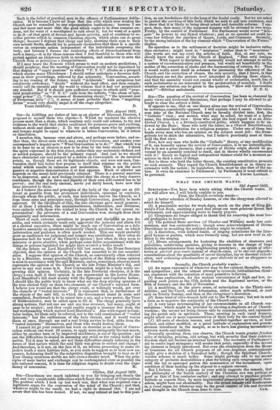Sur—The question of the revival of Convocation has been so
obscured by party views and irrelevant discussions, that perhaps I may be allowed to at- tempt to clear the subject a little. It appears to me that on one theory alone can the revival of Convocation be nowadays consistently opposed. I will explain what I mean. The views man take of the National Church may be broadly divided into, first, the "Catholic" view and second, what may be called, for want of a better name, the Arnoldian view : those who adopt the first regard it as an Esta- blished Church, i. e. a Divinely-instituted polity, which happens to be en- dowed by the State; those who hold the latter, as a Church Establishment, i. e. a national institution for a religious purpose. Under one of these two heads every man who has an opinion on the subject must fall : the Evan- gelicals try to shirk the alternative, but I believe practically most of them hold the first view.
Now, how any man who holds the "Catholic" theory, or any modification of it, can honestly oppose the revival of Convocation, is to me unintelligible. For is it not a gross anomaly, that a society of Divine origin should be go- verned by an assembly external to itself, and in theory wholly unconnected with it ? Surely no logical and independent thinker could for a moment ac- quiesce in shch a state of things. But to those who hold the latter theory, the existing constitution presents no such anomaly. They regard the Church Establishment as in theory co- extensive with the nation ; its legislation, then, must be also that of the na- tion. It owes its existence to Parliament; by Parliament it must submit to


























 Previous page
Previous page